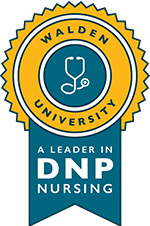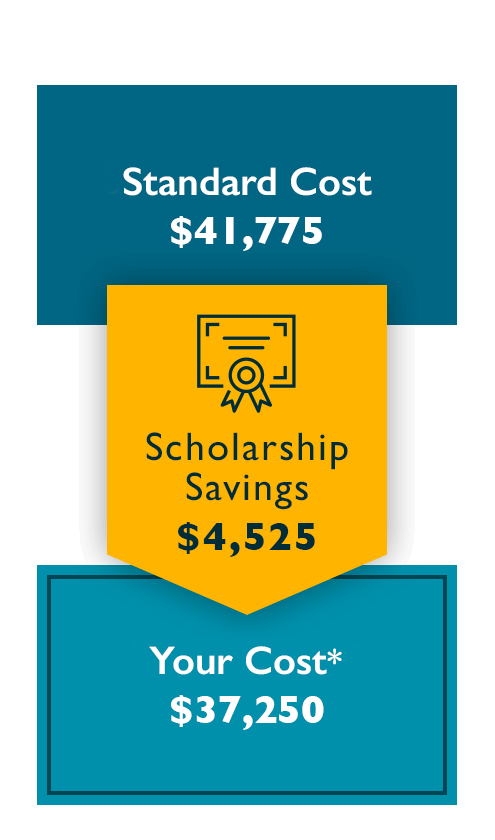Why Choose Walden?
We are here to help you find your nursing practicum.
CCNE-Accredited Nursing Programs That Inspire Confidence
In nursing, confidence is everything—and we want you to have confidence in Walden’s CCNE-accredited nursing programs. Accreditation signals program quality, and assures an educational experience aligned with the demands of today’s nursing field. The baccalaureate degree program in nursing (BSN), master’s degree program in nursing (MSN), post-graduate APRN certificate program, and Doctor of Nursing Practice (DNP) program at Walden University are accredited by the Commission on Collegiate Nursing Education (www.ccneaccreditation.org). Be ready for what’s next with a Walden degree.
Program Details
Curriculum
Minimum Degree Requirements
- 45 quarter credits
- Doctoral Writing Assessment (0 cr.)
- Foundation course (5 cr.)
- Core courses (25 cr.)
- Field experience (up to 8 cr., for students with fewer than 600 documented practicum hours)
- Completion of DNP project (15 cr.)
View the COMPLETE CURRICULUM PLAN.
Admission Requirements
All specializations except Executive Leadership: To be considered for this doctoral program, you must have a current, active RN license, a Master of Science in Nursing, or a Bachelor of Science in Nursing and a master’s degree in a business or non-nursing health related field, or an equivalent from an accredited school, and meet the general admission requirements. All applicants must submit a completed online application and transcripts. Depending on program specialization, additional requirements may apply. More information for international applicants.
Executive Leadership Specialization: To be considered for this doctoral program, you must have a current, active RN license, a Master of Science in Nursing, or a Bachelor of Science in Nursing and a master’s degree in a business or non-nursing health related field, or an equivalent from an accredited school, and meet the general admission requirements. All applicants must submit a completed online application and transcripts. Depending on program specialization, additional requirements may apply. More information for international applicants.
Personalized Practicum Support
After you register for the Walden University Practicum Pledge™ (along with other requirements), if you can’t identify a site and preceptor, our dedicated Field Placement Team partners with you to secure your site and preceptor to help you find a match. This enhanced support gives you added confidence as you start your degree journey.
| Curriculum Components | Requirements | Cost | AMOUNT * | |
|---|---|---|---|---|
| Tuition-Coursework | 30 quarter credits* (coursework credits will vary based on incoming practicum hours) | $905 per quarter hour for coursework credits | $27,150^ | |
| Tuition-Doctoral Study | 15† quarter credits | $905 per quarter hour for doctoral study/project credits | $13,575 | |
| Program Fee | $175 per quarter | $1,050^ | ||
| $41,775+ | ||||
| BELIEVE & ACHIEVE SCHOLARSHIP YOUR TUITION | -$4,525 $37,250†* | |||
Tuition and fees are subject to change. Books and materials are not included. Students may incur additional costs for remedial writing assistance, if necessary, or for practicum, including but not limited to costs of travel to their practicum site, practicum onboarding fees, per quarter practicum fees, and liability insurance costs.
*Completion of the DNP program requires a minimum of 1,000 post-BSN practicum hours, with at least 400 hours at the DNP level. Students who have fewer than 600 documented practicum hours upon admission will be required to complete up to 8 additional credits of field experience (1 credit hour has a 1:8 ratio of credit to practicum hours resulting in 80 practicum hours per 1 credit hour).
^This assumes students successfully complete their coursework on the first attempt. and reflects the minimum time to completion. Time to completion varies by student, depending on individual progress and credits transferred, if applicable.
+Tuition and time to complete vary by student and may be reduced if transfer credits are accepted, or if you receive grants, scholarships, or other tuition reductions. Walden may accept up to 20 transfer credits. For a personalized estimate of the number of your transfer credits that Walden would accept, call an Enrollment Specialist at 844-768-0109.
†*Represents DNP Traditional Track, 600 documented post-BSN clinical practicum hours upon admission, minimum time to completion, and Believe and Achieve Scholarship. Your actual total program time and costs may vary. Believe and Achieve Scholarship based on current tuition. See Scholarship Details for more information.
Paying for Your Education
Our Enrollment Specialists can help you outline a plan and find resources for funding your education.
PROGRAM SAVINGS
Specializations
Most of our DNP specializations offer a BSN entry point
- The BSN to DNP track is ideal if you are a registered nurse (RN) and have earned your bachelor’s in nursing degree.
- The MSN to DNP track is ideal if you are a registered nurse (RN) and have earned your master’s in nursing degree.
Program Outcomes
Impact Patient Care at a Higher Level
You are a nurse and an advocate–you're a champion of more affordable, equitable, and accessible patient care. You’re a passionate problem-solver and innovator who’s always thinking three steps ahead. Earning your doctorate in nursing from Walden can help you maximize your talents and lead much-needed change in an evolving field. Improve your practice and your community through practical learning experiences and a curriculum focused on making a social impact.
Learning Outcomes
Graduates of Walden’s online DNP program will be prepared to:
- Translate research findings to direct evidence-based nursing practice.
- Develop organizational system changes for quality improvement in healthcare delivery in response to local and/or global community or workplace needs.
- Apply optimal utilization of healthcare information technology across healthcare settings.
- Advocate for the advancement of nursing and healthcare policy and standards to improve health outcomes by addressing positive social change and social policy initiatives through sharing of science-based knowledge with healthcare leaders and policy makers.
- Demonstrate leadership to facilitate collaborative teams for improving patient and population health outcomes.
- Utilize advanced nursing practice knowledge to implement methodologies to improve population and community health outcomes among culturally diverse populations.
- Establish a foundation for lifelong learning for continual elevation of contributions to the field of nursing through active involvement in professional organizations and/or other professional and community bodies.
Success Stories
How One Walden Grad Is Serving Disadvantaged Communities in Texas
Dr. Alvin Mena Cantero is a Cuban refugee physician who came to the U.S. and started his educational journey with Walden University. He has been sowing seeds of social change in Houston, Texas, and around the globe.
Testimonials
I had earned my MSN with Walden. I considered going further, but when they let me know they also had a doctoral program, there was no hesitation to complete my terminal degree with Walden.
I have a support system from Walden that I never could have imagined.
What I learned in the classroom, I immediately applied to my work.
Related Articles
You May Also Be Interested In
FAQ About Walden’s Online Doctor of Nursing Practice (DNP)
Walden’s DNP program is taught by 100% doctorally prepared didactic faculty and designed by industry experts to ensure a high-quality learning experience. Walden’s program offers a team-based, interdisciplinary approach to further prepare you for a leadership position and to meet the demands of the healthcare system. You will receive doctoral support from day one. From writing and research assistance to one-on-one faculty guidance, robust doctoral study support is central to Walden’s DNP program.
Learning Environment
Walden University’s DNP program’s online classrooms feature state-of-the-art learning technologies, media, and support materials. Students are matched as closely as possible with faculty who have the same area of interest to assist them with their DNP projects. With engaging case studies, a Writing Center, and a robust online library, you will be highly prepared to earn your credentials as a Doctor of Nursing Practice.
Student Support
Walden’s program offers a robust support staff that is dedicated to your success, including academic advisors, graduation counselors, and practicum coordinators. Your practicum coordinators can assist you in securing your clinical practice site and help answer any questions.
Quality Program
Our program is developed by industry experts in their areas of practice. One hundred percent of College of Nursing didactic faculty hold doctoral degrees, and our curriculum covers relevant and realistic scenarios to prepare you with the skills you need to succeed.
The Doctor of Nursing Practice (DNP) is designed for nurses seeking a terminal degree in nursing practice and prefer an alternative to research-focused doctoral programs. A DNP-prepared nurse is seen as a clinical expert and leader, able to translate research into practice to improve systems and patient outcomes. With a DNP, you will have earned the top-level credential you need to become a leader in the healthcare field. Combined with the right experience, your DNP can prepare you for such roles as chief nursing officer at a hospital, director of policy in government, nurse administrator, or other nursing leadership positions.
Career options may require additional experience, training, or other factors beyond the completion of this degree program.
For MSN-educated nurse leaders who strive to work at the peak of their profession, a PhD in Nursing or a Doctor of Nursing Practice (DNP) degree program is the next logical step in their online education and career strategy. Whether they choose to earn a DNP or a PhD in Nursing, there are several reasons nurses decide to pursue a doctoral degree.
- A DNP or a PhD in Nursing can help you find your voice and gain the knowledge and confidence you need to reach your full potential.
- A doctoral degree can help you advance to the top of your profession to make a greater impact in the quality of patient care. A doctorate in nursing also opens the door to career opportunities in advanced leadership roles in administrative, academic, or clinical settings.
- Upon earning a doctorate in nursing, you will be qualified to mentor the next generation of nurses and fill leadership roles as a healthcare policymaker and advocate in a broad spectrum of public and private healthcare settings at the national, regional, state, county, and local levels.
Doctor of Nursing Practice (DNP)
As a terminal degree for clinical nurses, a Doctor of Nursing Practice (DNP) is becoming an increasingly valued and sought-after credential. The American Association of Colleges of Nursing has encouraged the medical community to make the DNP the expected degree for those who want to become nurse practitioners, nurse midwives, and nurse anesthetists. Nurses who currently hold an MSN and would like to advance their clinical practice would also benefit from a DNP.
PhD in Nursing
Focused primarily on research, a PhD in Nursing is designed for nurses who want to help guide the future of healthcare. If you want to conduct scientific research at the highest levels in your field, shape healthcare policies as a government policymaker or program director, or educate the next generation of nursing professionals, a PhD in Nursing can give you the advanced expertise you need to succeed. This is a great nursing degree for any nurse who wants to make a difference in healthcare.
A Doctor of Nursing Practice (DNP) gives you the top-level credential you need to become a leader in the healthcare field. Combined with the right experience, your DNP can prepare you for such roles as chief nursing officer at a hospital, director of policy in government, nurse administrator, nurse educator, or other nursing leadership positions. Additionally, a DNP elevates your career possibilities and increases your opportunity to drive social change in your organization and in the healthcare industry as a whole.
Career options may require additional experience, training, or other factors beyond the completion of this degree program.
Though this is primarily an institutional decision, a position statement from the American Association of Colleges of Nursing (AACN) advises that a DNP competes favorably with other practice doctorates in faculty tenure and promotion decisions.*
In healthcare, nurses with advanced degrees such as DNPs tend to attract higher salaries than nurses with bachelor’s or master’s degrees. This is due in part to the higher-level positions that can be obtained with a DNP, which are also typically marked by broader responsibilities. These additional tasks often command higher compensation, although the actual salary of a position may differ based on the type of role. For example, according to PayScale, the average salary for a chief nursing officer can range from $92,000 to $201,000.*
*PayScale, Chief Nursing Officer (CNO)/Salary (retrieved October 2020)
DNP-prepared nurses are leaders in their field, possessing a blend of clinical, economic, and organizational skills. The degree carries a certain level of influence that puts DNP-prepared nurses in a unique position to evaluate nursing practice, design patient care programs that are economically feasible and locally acceptable, and significantly impact healthcare outcomes.
Yes, the Doctor of Nursing Practice (DNP) program at Walden University is accredited by the Commission on Collegiate Nursing Education (www.ccneaccreditation.org).
A nursing practicum allows you to apply your new knowledge and skills in real-life situations and settings in order to gain valuable practical experience. For the nurse practitioner (NP) specializations in our Doctor of Nursing Practice (DNP) program, we offer the Walden Practicum Pledge™. You’ll benefit from our large network of field sites and preceptors as well as a dedicated Field Placement Team that partners with you to identify a site and preceptor. If you’re unable to identify your own practicum site and preceptor after several attempts, we’ll assist in finding you a suitable match (along with additional requirements*).
1Additional requirements for Walden's Practicum Pledge™
2Source: Institute of Medicine. The Future of Nursing Focus on Scope of Practice (October 2010).
3Source: O*Net Online. Summary Report for SOC Code 11-1011 Chief Executives. Sample of reported job titles include Chief Nursing Officer. Retrieved February 2021.
4Source: O*Net Online. Summary Report for SOC Code 11-9111 Medical and Health Services Managers. Sample of reported job titles include Clinical Director, Nursing Manager, Nursing Director. Retrieved February 2021.
5Source: O*Net Online, Summary Report for SOC Code 15-1211 Health Informatics Specialists. Sample of reported job titles include Nursing Informatics Specialist. Retrieved February 2021.
6Source: Bureau of Labor Statistics, Occupational Outlook Handbook, Pay: Top Executives (retrieved April 2021 using SOC code 11-1011). National salary estimates may not reflect local and/or short-term economic or job conditions, do not guarantee actual salaries, and are subject to change.
Commission on Collegiate Nursing Education (CCNE)
The baccalaureate degree program in nursing (BSN), master’s degree program in nursing (MSN), post-graduate APRN certificate program, and Doctor of Nursing Practice (DNP) program at Walden University are accredited by the Commission on Collegiate Nursing Education (www.ccneaccreditation.org).
Note on licensure: The Doctor of Nursing Practice (DNP) Traditional Program and DNP Executive Leadership specialization program are not licensure programs and will not prepare students for practice as licensed nurse practitioners.
Note on licensure:
The DNP nurse practitioner specializations programs are designed to prepare graduates with an active registered nurse (RN) license or APRN license to practice in the U.S. as nurse practitioners in their program specialty area. However, each state has its own academic preparation and authority to practice requirements and issues its own credential for an RN to be permitted to practice as a nurse practitioner in that state.
No graduate program can guarantee that graduates will obtain licensure to practice as a nurse practitioner. We encourage students to consult the appropriate board of nursing or regulatory authority in the states or jurisdictions in which they reside or intend to seek licensure to determine specific requirements. Walden Enrollment Specialists can provide general information relating to licensure; however, it remains the individual’s responsibility to understand, evaluate, and comply with all requirements relating to licensure for the state in which they intend to practice, as requirements vary widely.
Note on certification: Walden’s DNP NP specializations are designed to academically prepare graduates to apply for national certification. Walden makes no representations or guarantees that completion of Walden coursework or programs will permit an individual to achieve national certification. We encourage students to consult an appropriate certifying body for the specific certification eligibility requirements. Students should also consult their state board of nursing or other state agency to determine what certifications are required or accepted in that state. It is an individual’s responsibility to understand, evaluate, and comply with all requirements relating to national certification, as requirements vary widely. For more information about nurse practitioner certification exams, students should visit the American Academy of Nurse Practitioners Certification Board at www.aanpcert.org, the American Nurses Credentialing Center at www.nursingworld.org/ancc, or other nurse practitioner certification websites.
Enrollment Restrictions by State
Walden currently cannot enroll residents of the following states/districts into any DNP Program or Specialization: Connecticut, New York, Rhode Island
Walden currently cannot enroll residents of the following states/districts into any DNP Nurse Practitioner specialization: Louisiana, Oklahoma, Oregon
Walden currently cannot enroll residents of the following states/districts into the DNP Executive Leadership specialization: Washington state
Walden currently cannot enroll residents of the following states/districts into the DNP Psychiatric-Mental Health Nurse Practitioner (PMHNP) specialization: Arizona
Walden currently cannot enroll residents of the following states/districts into the DNP Pediatric Nurse Practitioner (PNP) specialization: Nevada
Note on Field Experience and Relocating
Students who are considering relocating are advised to contact their Student Success Advisor prior to any decision to relocate in order to determine how relocation may impact progress in their program. Advisors can provide information and guidance on how relocating may result in possible changes, restrictions, and/or additional requirements affecting field experience. Each Board of Nursing and Higher Education Authority governs the field experience rules and regulations in their respective states, and students may be unable to complete field experience in the state in which they plan to relocate. While Walden is committed to working collaboratively with students to secure field sites across the United States, it is imperative that students contact their Student Success Advisor immediately when considering relocating.



















